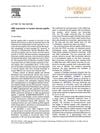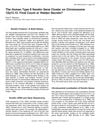 37 citations,
March 2006 in “Regulatory Peptides”
37 citations,
March 2006 in “Regulatory Peptides” Mice skin has components that could help with hair growth and might be used for diabetes treatment.
 120 citations,
February 2009 in “Apoptosis”
120 citations,
February 2009 in “Apoptosis” Understanding how cells die in the skin is important for treating skin diseases and preventing hair loss.
 50 citations,
March 2001 in “Clinics in Dermatology”
50 citations,
March 2001 in “Clinics in Dermatology” Genes and hormones cause hair loss, with four genes contributing equally.
 8 citations,
January 2009 in “Journal of pediatric endocrinology & metabolism/Journal of pediatric endocrinology and metabolism”
8 citations,
January 2009 in “Journal of pediatric endocrinology & metabolism/Journal of pediatric endocrinology and metabolism” A specific thyroid hormone resistance mutation may be linked to different types of hair loss.
 7 citations,
July 2005 in “Journal of Dermatological Science”
7 citations,
July 2005 in “Journal of Dermatological Science” The gene URB is more active in human hair growth cells and responds to a hair-related hormone.
 2 citations,
August 2023 in “Development”
2 citations,
August 2023 in “Development” Hair follicles in the back of the rosette fancy mouse have reversed orientations due to a gene mutation.
 1 citations,
February 2012 in “The American Journal of Cosmetic Surgery”
1 citations,
February 2012 in “The American Journal of Cosmetic Surgery” UBM helps hair regrowth in men and women with hair loss.
 181 citations,
January 2009 in “Nature Genetics”
181 citations,
January 2009 in “Nature Genetics” Certain mutations in a hair growth-related gene cause a type of genetic hair loss.
 111 citations,
January 2007 in “Seminars in cell & developmental biology”
111 citations,
January 2007 in “Seminars in cell & developmental biology” Hair, teeth, and mammary glands develop similarly at first but use different genes later.
 69 citations,
August 1999 in “Developmental biology”
69 citations,
August 1999 in “Developmental biology” The nude gene causes skin cell overgrowth and improper development, leading to hair and urinary issues.
 59 citations,
February 1998 in “Chemico-Biological Interactions”
59 citations,
February 1998 in “Chemico-Biological Interactions” Minoxidil breakdown varies by enzymes, affecting hair loss treatment effectiveness.
 51 citations,
February 2009 in “Journal of dermatological science”
51 citations,
February 2009 in “Journal of dermatological science” Pitx2 helps outer root sheath cells differentiate but can't start hair growth on its own.
 41 citations,
January 2020 in “BioMed Research International”
41 citations,
January 2020 in “BioMed Research International” Micrografts improve hair density and thickness without side effects.
 25 citations,
August 2014 in “Endocrinology”
25 citations,
August 2014 in “Endocrinology” Researchers created a mouse model of a type of rickets that does not cause hair loss.
 24 citations,
November 2008 in “Arquivos Brasileiros de Endocrinologia & Metabologia”
24 citations,
November 2008 in “Arquivos Brasileiros de Endocrinologia & Metabologia” Four patients with a type of rickets and hair loss had different mutations in their vitamin D receptor gene, causing it to not work properly.
 18 citations,
June 2017 in “Proceedings of the National Academy of Sciences of the United States of America”
18 citations,
June 2017 in “Proceedings of the National Academy of Sciences of the United States of America” A gene called Gk5 controls lipid production in the skin and affects hair growth.
 17 citations,
July 2014 in “Expert Opinion on Biological Therapy”
17 citations,
July 2014 in “Expert Opinion on Biological Therapy” The new method for isolating stem cells from fat is simple and effective, producing cells that grow faster and are better for hair regeneration.
 11 citations,
May 2021 in “Dermatologic clinics”
11 citations,
May 2021 in “Dermatologic clinics” PRP and cell therapies may help with hair loss, but more research is needed.
 10 citations,
August 2019 in “The World Journal of Men's Health”
10 citations,
August 2019 in “The World Journal of Men's Health” Kimchi probiotics slightly improved hair density, but more research needed.
 9 citations,
February 2005 in “The journal of investigative dermatology/Journal of investigative dermatology”
9 citations,
February 2005 in “The journal of investigative dermatology/Journal of investigative dermatology” The document concludes that the human keratin gene cluster is complex, with a need for updated naming to reflect over 50 functional genes important for hair and skin biology.
 4 citations,
January 2018 in “International Journal of Immunopathology and Pharmacology”
4 citations,
January 2018 in “International Journal of Immunopathology and Pharmacology” Fat tissue transplant may be an effective new treatment for severe, treatment-resistant hair loss from folliculitis decalvans.
 3 citations,
January 2019 in “Jikken doubutsu ihou/Jikken doubutsu/Experimental animals/Jikken Dobutsu”
3 citations,
January 2019 in “Jikken doubutsu ihou/Jikken doubutsu/Experimental animals/Jikken Dobutsu” Pigs without the Hairless gene showed skin and thymus changes, useful for studying human hair disorders.
 January 2024 in “bioRxiv (Cold Spring Harbor Laboratory)”
January 2024 in “bioRxiv (Cold Spring Harbor Laboratory)” The gene Ascl4 is not necessary for the development of hair, teeth, or mammary glands.
 October 2000 in “Annals of Dermatology”
October 2000 in “Annals of Dermatology” Finasteride effectively treats hair loss in men with minimal side effects.
 305 citations,
February 2007 in “Hormone and metabolic research”
305 citations,
February 2007 in “Hormone and metabolic research” Human skin makes sexual hormones that affect hair growth, skin health, and healing; too much can cause acne and hair loss, while treatments can manage these conditions.
 271 citations,
September 2008 in “Nutrition reviews”
271 citations,
September 2008 in “Nutrition reviews” Vitamin D receptor interacts with certain dietary components to help prevent diseases and regulate hair growth.
 233 citations,
November 2002 in “The journal of investigative dermatology/Journal of investigative dermatology”
233 citations,
November 2002 in “The journal of investigative dermatology/Journal of investigative dermatology” Creating stronger blockers for skin enzymes might lead to better treatment for conditions like acne and excessive hair growth.
 127 citations,
January 2013 in “PLOS ONE”
127 citations,
January 2013 in “PLOS ONE” Probiotic bacteria improved skin and hair health in aged mice.
 95 citations,
February 2019 in “The New England Journal of Medicine”
95 citations,
February 2019 in “The New England Journal of Medicine” Mutations in the PADI3 gene are linked to a higher risk of scarring hair loss in women of African descent.
 76 citations,
June 2015 in “Journal of biomedical science”
76 citations,
June 2015 in “Journal of biomedical science” Mutations in Gasdermin A3 cause skin inflammation and hair loss by disrupting mitochondria.






























